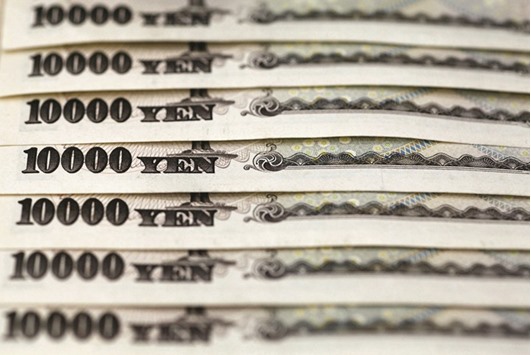Publicly, Japanese policymakers have railed against the yen’s rapid appreciation to 18-month highs, putting investors on high alert against possible intervention in currency markets.
Behind the scenes, though, those running economic policy have told Reuters they’re not so worried that the yen will derail efforts to revive exports and the economy.
Those more sanguine views suggest markets might be overestimating the likelihood of intervention.
“I don’t think you can simply say the yen’s rise is a bad thing,” one government official told Reuters, declining to be named due to the sensitivity of the matter.
International differences over currencies could be a focus at a meeting of Group of Seven finance leaders in Japan this weekend.
And to be sure, concerns about the strong yen are real. The safe-haven currency rallies during periods of market anxiety and uncertainty, having done so even after the central bank’s unexpected shift to negative interest rates this year.
Toyota Motor President and CEO Akio Toyoda has warned foreign exchange losses could wipe as much as ¥935bn ($8.5bn) from the automaker’s operating profit this year, noting that each 1 yen move against the dollar affects its operating profit by ¥40bn.
When an economic heavyweight like Toyota reports such severe currency effects, the government must be seen to act.
So far, Finance Minister Taro Aso’s response has been to condemn rapid rises in the yen and threaten to step into the foreign exchange market – despite international objections to currency intervention.
However, the view is spreading among economic officials close to the Prime Minister’s Office that the yen in its recent range of 105-109 to the dollar would not upset economic recovery.
At 110 to the dollar on Thursday, the yen is trading considerably weaker than its comparative purchasing power of 103, according to valuations that look at consumer price ratios between countries.
Even in the Finance Ministry, which runs Japan’s currency policy, few officials express concern that the yen’s strength will stifle growth.
Rather, Japan’s currency mandarins fret more over the speed of exchange rate moves than the actual level. A Finance Ministry official told Reuters that Aso, while warning against volatility, has not commented on the exchange rate, which Aso says is set by the market.
At a meeting of the Group of 20 big economies last month, Aso told US Treasury Secretary Jack Lew of Tokyo’s “strong concern” over “one-sided” yen rises. Lew fired back that he saw no “disorderly” moves in the market that might justify intervention, and said it was vital to avoid “beggar-thy-neighbour exchange rate policies”.
While a Lew-Aso divide may attract headlines from this weekend’s meeting of G7 finance ministers and central bankers in Sendai, northern Japan, officials expect the group to paper over differences by repeating general calls for exchange rate stability.
The yen has swung wildly since late 2012, when Prime Minister Shinzo Abe came to power promoting easy-money “Abenomics” policies to boost Japan from two decades of deflation and fitful growth. The yen sank 37% to 13-year lows on massive Bank of Japan (BOJ) yen-printing by June 2015.
This month, it rebounded 19% to 105.55, its strongest since October 2014, spurred by the BOJ’s surprise decision not to ease policy further.
Some market participants worry about a knock-on effect of a higher yen hitting profits, battering stock prices further, and undoing more of the gains of “Abenomics”.
“There is growing unease about the outlook for the Japanese economy, which has been supported by the weak yen,” said Shingo Ide, chief equity strategist at NLI Research Institute.
Market participants think 100 yen to the dollar is the ‘red line’ for Japan’s policymakers, a Reuters survey of some 70 currency strategists found this month.

Japanese 10,000 yen notes’ line-up in Tokyo. Publicly, Japanese policymakers have railed against the yen’s rapid appreciation to 18-month highs, putting investors on high alert against possible intervention in currency markets.
